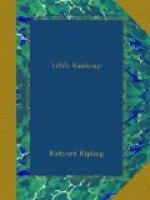‘I heard,’ I answered. ‘Imray made a mistake.’
’Simply and solely through not knowing the nature of the Oriental, and the coincidence of a little seasonal fever. Bahadur Khan had been with him for four years.’
I shuddered. My own servant had been with me for exactly that length of time. When I went over to my own room I found my man waiting, impassive as the copper head on a penny, to pull off my boots.
‘What has befallen Bahadur Khan?’ said I.
‘He was bitten by a snake and died. The rest the Sahib knows,’ was the answer.
‘And how much of this matter hast thou known?’
’As much as might be gathered from One coming in in the twilight to seek satisfaction. Gently, Sahib. Let me pull off those boots.’
I had just settled to the sleep of exhaustion when I heard Strickland shouting from his side of the house—
‘Tietjens has come back to her place!’
And so she had. The great deerhound was couched statelily on her own bedstead on her own blanket, while, in the next room, the idle, empty, ceiling-cloth waggled as it trailed on the table.
NAMGAY DOOLA
There came to the beach a poor exile of Erin,
The dew on his wet robe hung heavy and chill;
Ere the steamer that brought him had passed out of hearin’,
He was Alderman Mike inthrojuicin’ a bill!
American song.
Once upon a time there was a King who lived on the road to Thibet, very many miles in the Himalayas. His Kingdom was eleven thousand feet above the sea and exactly four miles square; but most of the miles stood on end owing to the nature of the country. His revenues were rather less than four hundred pounds yearly, and they were expended in the maintenance of one elephant and a standing army of five men. He was tributary to the Indian Government, who allowed him certain sums for keeping a section of the Himalaya-Thibet road in repair. He further increased his revenues by selling timber to the railway-companies; for he would cut the great deodar trees in his one forest, and they fell thundering into the Sutlej river and were swept down to the plains three hundred miles away and became railway-ties. Now and again this King, whose name does not matter, would mount a ringstraked horse and ride scores of miles to Simla-town to confer with the Lieutenant-Governor on matters of state, or to assure the Viceroy that his sword was at the service of the Queen-Empress. Then the Viceroy would cause a ruffle of drums to be sounded, and the ringstraked horse and the cavalry of the State—–two men in tatters—and the herald who bore the silver stick before the King would trot back to their own place, which lay between the tail of a heaven-climbing glacier and a dark birch-forest.
Now, from such a King, always remembering that he possessed one veritable elephant, and could count his descent for twelve hundred years, I expected, when it was my fate to wander through his dominions, no more than mere license to live.




